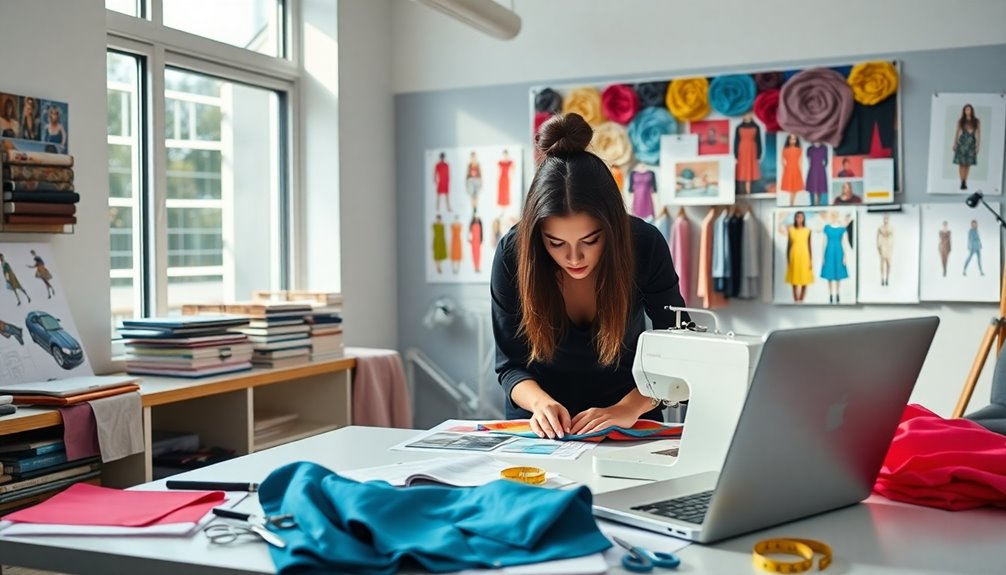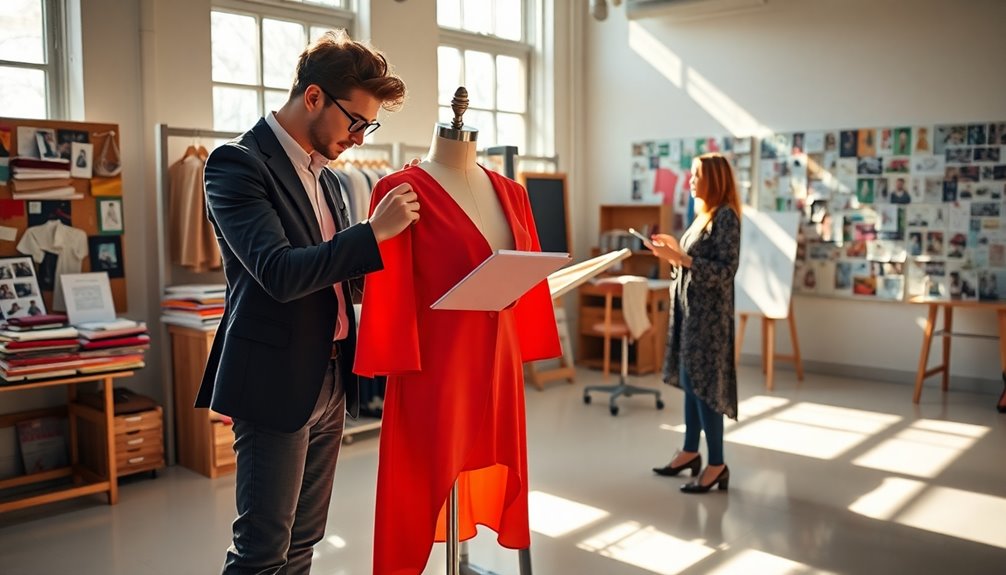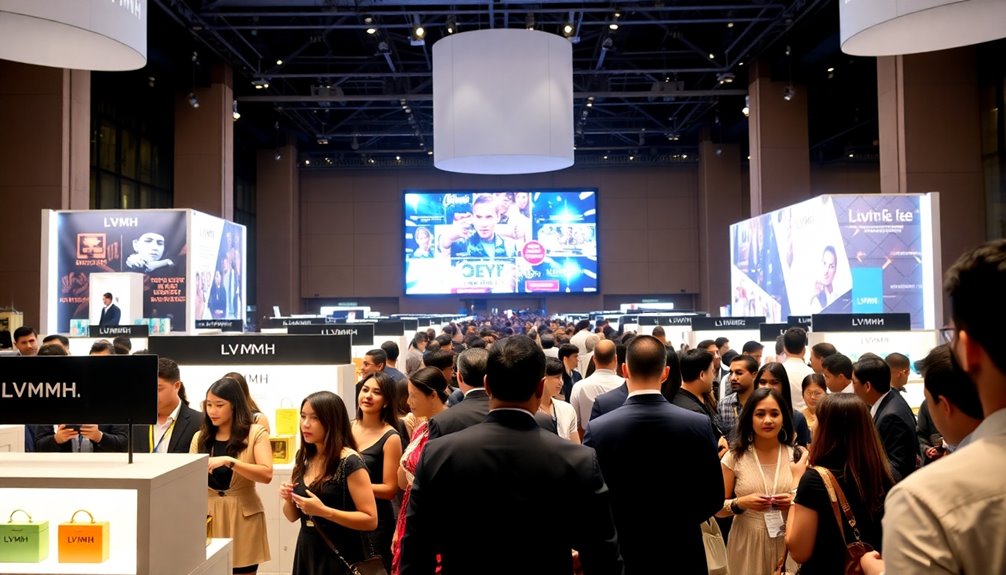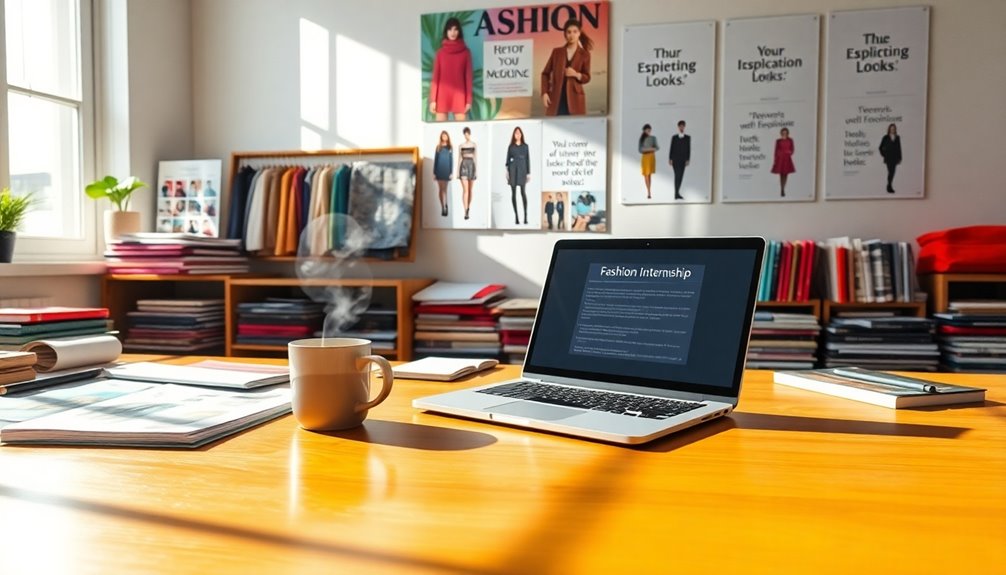As a fashion intern, you'll immerse yourself in the fast-paced fashion world, gaining hands-on experience that's crucial for your career. You'll conduct research on trends, assist in sketches, and handle practical design tasks, like sourcing fabrics and coordinating photo shoots. Creativity and attention to detail are key, so hone these skills while communicating effectively with your team. Don't forget to network; it's invaluable for your future opportunities. Manage your time well to balance the diverse responsibilities you'll face. This is just the beginning—there's so much more to enhance your internship experience and set you up for success!
Key Takeaways
- Expect to assist in design tasks, including sketching, sourcing fabrics, and managing wardrobe logistics during events and photo shoots.
- Develop strong creativity and attention to detail to ensure high-quality garment standards and effective design communication.
- Enhance your networking skills by connecting with industry professionals and attending fashion events for future opportunities.
- Manage your time effectively to prioritize tasks and adapt to tight deadlines while maintaining high performance.
- Utilize social media and marketing skills to promote the brand and engage with the audience, showcasing your abilities to potential employers.
Understanding Your Responsibilities

As a fashion intern, you’ll dive into a variety of responsibilities that shape the day-to-day operations of the industry. Your role often starts with research—trends and fashions are crucial, so you’ll select and present images and ideas that inspire your team. You’ll assist designers in sketching and bringing ideas to life, learning about silhouettes, colors, and textures along the way. As a fashion intern, you’ll also have the opportunity to assist with styling and coordinating photo shoots, as well as organizing and maintaining the wardrobe and accessories. In addition to these responsibilities, you may also take on the role of the fashion editor assistant, where you’ll help with proofreading, fact-checking, and organizing fashion spreads for publication. This hands-on experience will provide you with a well-rounded understanding of the fashion industry and valuable skills for your future career.
You'll also help with the practical side of design, like buying fabrics and assembling accessories that complement finished pieces. Cutting and sewing fabric, making patterns, and arranging showrooms will become part of your routine. When supplies run low, contacting material suppliers to replenish stock will be your responsibility.
Beyond design, you'll play a key role in special events and photo shoots. Planning shoots, dressing models, and managing logistics for product launches and fashion shows will keep you on your toes. Additionally, your involvement in event coordination will ensure that all aspects of the events run smoothly.
You'll also handle administrative tasks, from replying to emails to engaging in brand promotion.
In wardrobe management, keeping the company closet organized and performing routine maintenance is essential. Each task you tackle contributes to a vibrant and dynamic fashion environment. Embrace these responsibilities and make the most of your internship!
Essential Skills for Interns

Navigating the fast-paced world of fashion requires a unique set of essential skills that can set you apart as an intern. First and foremost, creativity is crucial. You'll need to develop fresh ideas and have strong drawing and visualization skills to effectively communicate your concepts. An innovative mindset lets you think outside the box, crucial for tackling design challenges.
Attention to detail and quality control are also vital. You should possess a sharp eye for spotting mistakes, ensuring every garment and design meets high standards. This precision helps you maintain quality in all your tasks, from administrative work to design. Internships provide hands-on experience in ensuring that you develop this critical skill.
Effective communication and collaboration skills are key to working within diverse teams. You must clearly express your ideas and work well with others, including designers and stylists. Strong networking abilities help you build valuable relationships in the industry.
Lastly, time management and adaptability are essential. You'll face tight deadlines and must prioritize tasks effectively. Staying flexible allows you to shift between various roles and keep up with the latest fashion trends, ensuring you contribute meaningfully to your team's success.
Embrace these skills, and you'll excel in your internship.
Key Design and Production Tasks

Key design and production tasks in a fashion internship immerse you in the creative and logistical aspects of the industry.
You'll begin by researching trends and presenting your findings to designers. Assisting in sketching ideas and creating technical drawings using CAD software will sharpen your design skills. You'll also help buy fabrics and assemble accessories that complement finished pieces, while maintaining presentation boards for design concepts. Understanding the various roles in the fashion industry will enhance your ability to collaborate effectively with different team members.
In production, you'll cut and sew fabric, make patterns, and participate in fittings, providing crucial feedback on garment construction and fit.
You'll assist in sourcing and selecting fabrics and trims for various projects, ensuring they align with design visions. Preparing tech packages for production will familiarize you with the technical side of fashion.
Managing wardrobe and samples is another essential task. You'll locate and organize wardrobe pieces, ensuring they're accounted for and well-maintained.
Additionally, you'll keep track of access to these items and archive trims in the library. Understanding fabric quality and negotiating with suppliers will also be part of your responsibilities, helping you develop a comprehensive grasp of the fashion industry.
Event and Project Management

Event and project management in a fashion internship offers a dynamic blend of creativity and organization. You'll be tasked with developing innovative event concepts that align with the brand's goals and identity.
Start by creating detailed event plans with timelines and risk assessments to ensure everything runs smoothly. Setting clear objectives and discussing them with designers and stakeholders is crucial for your success.
Vendor management is another key aspect of your role. You'll source and oversee vendors, including venues and caterers, while negotiating contracts to facilitate seamless execution.
Communication is vital, so keep collaboration strong among all parties involved.
Budget management also falls under your responsibilities. You'll develop and monitor event budgets, ensuring adherence to financial constraints while preventing risks. Understanding budget management is essential to track expenses and fulfill sponsorship agreements, which is crucial for maintaining profitability.
On the event day, you'll oversee staff, ensuring all components are in place for a successful execution.
Collecting feedback from attendees and participants post-event will help you analyze success and identify areas for improvement.
Embrace these tasks, and you'll excel in your fashion internship, gaining invaluable experience in event and project management.
Administrative Support Duties

While managing events requires a blend of creativity and organization, your role in administrative support duties is equally significant in ensuring the overall success of your internship.
You'll find yourself answering phone calls and handling inquiries, which sets the tone for communication within the team. Checking and replying to emails is crucial for maintaining smooth operations, as is managing social media accounts to engage your audience.
Drafting press releases and promotional materials will sharpen your writing skills and help shape the brand's image. You'll also prepare and arrange meetings, making sure all logistics are in place.
Communication is key; you'll contact material suppliers, negotiate with vendors, and pitch clients to magazines. Additionally, this experience provides valuable exposure to various aspects of the fashion industry.
Record-keeping and organization are vital, too. You'll maintain databases, track wardrobe samples, and keep the company closet orderly.
Running errands and handling basic logistical tasks will further develop your multitasking abilities. Lastly, producing newsletters and assisting in marketing campaigns will enhance your understanding of the fashion industry.
Skills for Career Success

To thrive in the fashion industry, you'll need a diverse set of skills that blend creativity, technical know-how, and strong interpersonal abilities. First, hone your creative skills by generating innovative ideas and developing a keen sense of style. Master the art of design conceptualization, enabling you to sketch and visualize concepts effectively. Creating mood boards will also help align your vision with project goals.
On the technical side, understanding fabric quality and color matching is essential. Gain proficiency in software like Adobe Photoshop and Illustrator, as these tools are pivotal for modern fashion design. Basic illustration and pattern creation skills will also empower you to communicate design ideas clearly. Additionally, having internship experience is often viewed as a key requirement for entry-level positions, making it crucial to gain practical knowledge through internships.
Interpersonal skills are vital too. Work on your communication abilities to relay your ideas efficiently. Building a network within the industry can keep you informed on trends and opportunities. Embrace teamwork, collaborating with various professionals to achieve shared objectives.
Lastly, cultivate organizational skills like time management and adaptability to thrive under pressure and meet tight deadlines. With these skills, you'll position yourself for success in your fashion career.
Tips to Stand Out

Consistently standing out in the competitive fashion industry requires a strategic approach. Start by networking actively; attend fashion events and connect with industry professionals. Utilize your campus resources and alumni networks to discover internship opportunities and gather valuable advice.
Don't overlook LinkedIn—reach out for informational interviews to expand your connections. Volunteering at major events, like New York Fashion Week, can also provide insights and vital contacts. Fashion colleges often have direct pipelines to top brands that can enhance your internship experience. Additionally, leveraging data analytics can help you understand market trends and tailor your approach to potential employers. Consider utilizing NLP tools to analyze fashion consumer sentiment and adjust your strategies accordingly. Maintaining a focus on emotional alignment can also help you navigate workplace dynamics and foster better relationships with colleagues. Understanding the principles of Law of Attraction can also enhance your mindset, empowering you to attract positive opportunities.
It's essential to maintain good mental health, as stress management techniques can improve your overall performance during your internship. Apply early for internships to increase your visibility. Research each company thoroughly and customize your applications to reflect genuine interest. Gather all necessary materials in advance, double-checking details like start times and dress codes.
Get creative with your applications. Don't just rely on job boards; consider cold emailing or sending unsolicited portfolios to showcase your talent. Highlight any online courses you've taken to demonstrate initiative and passion.
From day one, maintain professionalism—arrive on time and show enthusiasm, even for mundane tasks. Hone your time management and organization skills to manage responsibilities effectively.
Finally, stay informed about the industry, allowing you to engage meaningfully with your coworkers and demonstrate your dedication.
Frequently Asked Questions
What Should I Wear to My Fashion Internship?
When deciding what to wear to your fashion internship, aim for a polished look that reflects professionalism and style.
Choose tailored pieces like blazers, dress shirts, or smart casual dresses. Avoid anything too revealing or overly casual. Stick to dark, traditional colors, and ensure your clothes are clean and well-fitted.
Feel free to accessorize subtly to showcase your personality while keeping it appropriate. If you're unsure, ask your employer for specific guidelines.
How Can I Network Effectively in the Fashion Industry?
To network effectively in the fashion industry, attend shows, workshops, and events to meet key players.
Connect with photographers, designers, and stylists on social media platforms like Instagram and LinkedIn. Start conversations and show genuine interest in their work.
Follow up with business cards and engage in group discussions to build relationships. Collaborate on projects to establish trust, and utilize social media to showcase your work and stay updated on trends.
What Are Common Challenges Faced by Fashion Interns?
As a fashion intern, you'll face several common challenges.
Financial struggles often arise, especially with unpaid internships, forcing you to juggle multiple jobs.
You might find yourself assigned menial tasks that don't enhance your skills or learning.
Additionally, the fast-paced environment can be overwhelming, and you may encounter a lack of support or guidance from supervisors.
Networking opportunities might be limited too, making it harder to connect with industry professionals.
How Do I Handle Criticism From Supervisors?
When you handle criticism from supervisors, listen carefully and take notes to ensure you understand their feedback.
Don't take it personally; it's about your work. If anything's unclear, ask for clarification.
Stay calm and take responsibility, proposing solutions rather than making excuses. Document the feedback and act on it promptly.
Keep an open mind, view criticism as a chance for growth, and maintain professionalism to strengthen your relationships at work.
What Tools or Software Should I Be Familiar With?
You should be familiar with essential design tools like Adobe Illustrator for sketching and patternmaking.
Digital Fashion Pro can help you create professional sketches easily.
For 3D prototyping, get comfortable with CLO 3D or Tukatech, as they enhance visualization and pattern accuracy.
Understanding PLM software like WFX PLM or ApparelMagic streamlines product development.
Mastering these tools will boost your efficiency and creativity in the fast-paced fashion industry.
Conclusion
As a fashion intern, embracing your responsibilities and honing essential skills can set you apart in this competitive industry. Keep a proactive attitude, stay organized, and seek opportunities to learn from your colleagues. By excelling in design tasks, managing events, and providing vital administrative support, you'll not only build a solid foundation for your career but also showcase your commitment and creativity. Remember, making a lasting impression starts with your eagerness to grow and contribute.









